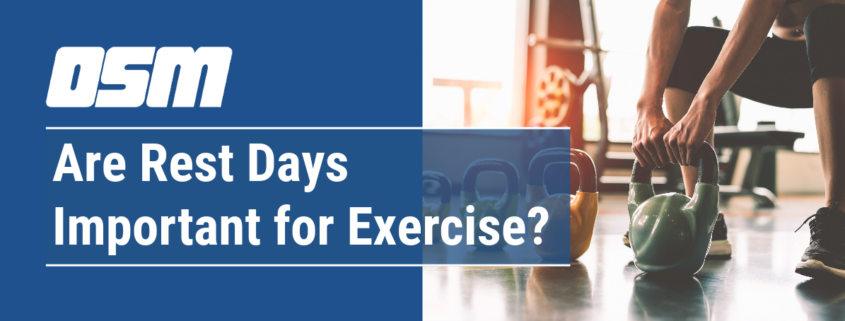Are Rest Days Important for Exercise?
Article featured on Healthline
We’re always told to stay active and get regular exercise. But whether you’re training for a competition or feeling extra motivated, more isn’t always better.
Rest days are just as important as exercise. A successful fitness regimen isn’t complete without rest days.
Taking regular breaks allows your body to recover and repair. It’s a critical part of progress, regardless of your fitness level or sport. Otherwise, skipping rest days can lead to overtraining or burnout.
Plus, your muscles need glycogen to function, even when you’re not working out. By getting adequate rest, you’ll prevent fatigue by letting your glycogen stores refill.
3. Reduces risk of injury
Regular rest is essential for staying safe during exercise. When your body is overworked, you’ll be more likely to fall out of form, drop a weight, or take a wrong step.
Overtraining also exposes your muscles to repetitive stress and strain. This increases the risk of overuse injuries, forcing you to take more rest days than planned.
4. Improves performance
When you don’t get enough rest, it can be hard to do your normal routine, let alone challenge yourself. For example, you might be less motivated to do an extra rep or run another mile.
Even if you push yourself, overtraining decreases your performance. You may experience reduced endurance, slow reaction times, and poor agility.
Rest has the opposite effect. It increases energy and prevents fatigue, which prepares your body for consistently successful workouts.
5. Supports healthy sleep
While regular exercise can improve your sleep, taking rest days is also helpful.
Physical activity increases energy-boosting hormones like cortisol and adrenaline. Constant exercise, however, overproduces these hormones. You’ll have a hard time getting quality sleep, which only worsens fatigue and exhaustion.
Rest can help you get better sleep by letting your hormones return to a normal, balanced state.
How to do rest days right
The ideal rest day looks different for each person. It depends on the intensity and frequency of your normal routine, along with your lifestyle outside of exercise.
However, there are general guidelines for incorporating rest days in various workouts.
Cardio
Typically, rest days aren’t necessary for light cardio. This includes activities like leisurely walking or slow dancing. It’s safe enough to do every day, unless your doctor says otherwise.
But if you’re doing moderate or vigorous aerobic activity, rest days are essential. It’s recommended to take a rest day every three to five days. If you do vigorous cardio, you’ll want to take more frequent rest days.
You can also have an active rest day by doing a light workout, like gentle stretching.
To determine when you should rest, consider the recommendations for aerobic activity. Each week, adults should get 150 to 300 minutes of moderate activity or 75 to 150 minutes of vigorous activity. You can also do a combination of moderate and vigorous activity.
These guidelines can help you plan your rest days. For example, if you’d like to do three days of 50-minute vigorous cardio sessions, you can plan rest days and other workouts around them.
Running
While running is a form of cardio, it usually requires a different approach to rest days.
If you’re a beginner, start running three days a week. Running too much too soon can lead to fatigue and overuse injuries.
On the other days, let yourself rest or do different activities. Your other workouts should involve muscles you don’t use while running.
Rest days are even more important if you’re training for a marathon. In the last three weeks before the event, it’s best to rest more often. A personal trainer or running coach can explain how to rest based on your goals.
Bodybuilding
Bodybuilding, or weight training, incorporates rest days by rotating the muscles worked.
After exercising a specific muscle group, let it rest for one to two days. This gives your muscles a chance to repair and heal.
On the other days, train different muscles. Be sure to work opposing muscles to keep your body balanced.
One way to do rest days is to assign a day for each body part. For instance, Monday can be leg day, Tuesday can be chest day, and so on.
For weight loss
If you’re trying to lose weight, you should still have regular rest days.
Rest allows your muscles to rebuild and grow. And when you have more muscle, you’ll burn more calories at rest. That’s because muscle burns more energy than fat.
Additionally, when you feel refreshed, you’ll be more likely to stick to your exercise routine.
The Orthopedic & Sports Medicine Center of Oregon is an award-winning, board-certified orthopedic group located in downtown Portland Oregon. We utilize both surgical and nonsurgical means to treat musculoskeletal trauma, spine diseases, foot and ankle conditions, sports injuries, degenerative diseases, infections, tumors and congenital disorders.
Our mission is to return our patients back to pain-free mobility and full strength as quickly and painlessly as possible using both surgical and non-surgical orthopedic procedures.
Our expert physicians provide leading-edge, comprehensive care in the diagnosis and treatment of orthopedic conditions, including total joint replacement and sports medicine. We apply the latest state-of-the-art techniques in order to return our patients to their active lifestyle.
If you’re looking for compassionate, expert orthopedic and podiatric surgeons in Portland Oregon, contact OSM today.
Phone:
Address
17355 Lower Boones Ferry Rd Suite 100A
Lake Oswego, OR 97035
Hours
Monday–Friday
8:00am – 4:30pm



